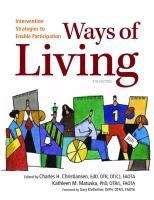Ways Of Living: Intervention Strategies To Enable Participation (4)
By: and
Sign Up Now!
Already a Member? Log In
You must be logged into Bookshare to access this title.
Learn about membership options,
or view our freely available titles.
- Synopsis
- Forlagets beskrivelse: Students often say, "I studied 40 hours for this exam and I still didn't do well. Where did I go wrong?" Most instructors hear this complaint every year. In many cases, it is true that the student invested countless hours, only to produce abysmal results. Often, inefficient study habits are to blame. The important question is: why do so many students have difficulty preparing themselves for organic chemistry exams? There are certainly several factors at play here, but perhaps the most dominant factor is a fundamental disconnect between what students learn and the tasks expected of them. To address the disconnect in organic chemistry instruction, David Klein has developed a textbook that utilizes a skills-based approach to instruction. The textbook includes all of the concepts typically covered in an organic chemistry textbook, but special emphasis is placed on skills development to support these concepts. This emphasis upon skills development will provide students with a greater opportunity to develop proficiency in the key skills necessary to succeed in organic chemistry. As an example, resonance structures are used repeatedly throughout the course, and students must become masters of resonance structures early in the course. Therefore, a significant portion of chapter 1 is devoted to drawing resonance structures. Two chapters (6 and 12) are devoted almost entirely to skill development. Chapter 6 emphasizes skills that are necessary for drawing mechanisms, while chapter 12 prepares the student for proposing syntheses. In addition, each chapter contains numerous Skillbuilders, each of which is designed to foster a specific skill. Each skillbuildercontains three parts: 1. Learn the Skill: a solved problem that demonstrates a particular skill; 2. Practice the Skill: numerous problems (similar to the solved problem) that give the students an opportunity to practice and master the skill; 3. Apply the Skill: one or two more-challenging problems in which the student must apply the skill in a slightly different environment. These problems include conceptual, cumulative, and applied problems that encourage students to think out of the box. Sometimes problems that foreshadow concepts introduced in later chapters are also included. All SkillBuilders are visually summarized at the end of each chapter (Skillbuilder review), followed by a list of suggested in-chapter and end-of-chapter practice problems.
- Copyright:
- 2011
Book Details
- Book Quality:
- Excellent
- Book Size:
- 592 Pages
- ISBN-13:
- 9781569002988
- Publisher:
- American Occupational Therapy Association, Incorporated
- Date of Addition:
- 04/29/20
- Copyrighted By:
- American Occupational Therapy Association, Inc.
- Adult content:
- No
- Language:
- English
- Has Image Descriptions:
- No
- Categories:
- Nonfiction, Health, Mind and Body, Medicine
- Submitted By:
- Daproim Africa
- Proofread By:
- Daproim Africa
- Usage Restrictions:
- This is a copyrighted book.
Reviews
Other Books
- by Charles H. Christiansen
- by Kathleen M. Matuska
- in Nonfiction
- in Health, Mind and Body
- in Medicine
